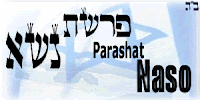"The Gift Of Restitution"
Parashat HaShavua Naso / Elevate

This Week's Reading List:
BaMidbar / Numbers 4:21-7:89
Shoftim / Judges 13:2-25
Ma'asei Talmidim / Acts 21:17-26
Bamidbar {5:5} HaShem spoke to Moshe (Moses), saying, {5:6} Speak to bnei Yisrael (children of Israel), When an ish (man) or ishah (woman) shall commit any chatat (sin) that men commit, so as to trespass against HaShem, and that nefesh (soul) shall be guilty; {5:7} then he shall confess his chatat which he has done: and he shall make restitution for his guilt in full, and add to it the fifth part of it, and give it to him in respect of whom he has been guilty. {5:8} But if the ish have no kinsman to whom restitution may be made for the guilt, the restitution for guilt which is made to HaShem shall be the Cohen's; besides the ram of the Kapparah (Atonement), whereby Kapparah shall be made for him. {5:9} every heave-offering of all the Kadosh (separate / holy) things of bnei Yisrael, which they present to the Cohen, shall be his. {5:10} every man's kadosh things shall be his: whatever any ish gives the Cohen, it shall be his.
At times, when a person sins they need to not only ask forgiveness, both from HaShem and the person they sinned against but also they need to make restitution. For example: a thief, when caught, needed to make restitution to the person he stole from. He was to return what he stole plus he was to add twenty percent more to it. However, what happens if the thief is caught years later and the victim is dead with no living relatives? What is the thief to do then? This passage of Scripture from Parasha Naso answers that question for us. It says that restitution is to be made to a kinsman, and if there is no kinsman it is to be made to the Cohen. So whatever that restitution was, the Cohen was to receive it for his own personal use.
As we know there is no longer a Temple in Yerushalayim (Jerusalem), nor is there an Aharonic priesthood presiding over the Temple services, so we need to ask ourselves, “If this mitzvah (commandment) is Temple and priesthood dependant, does it still have application today?” The answer to that question is “yes,” and I will explain why shortly.
Even though Yeshua HaMashiach forgives us for our sins when we confess our sins, there are still consequences for sin, and we must therefore still make restitution if we have cheated, stolen, borrowed something without returning it or caused anyone expense as a result of our sin. However, what if we come up against a situation as specified in our Scripture passage above? There is no longer any Temple. There is no longer a Cohen. So how do we make restitution if the person we have sinned against has passed away without having any next of kin or if the company we took something from is no longer in business?
Now, I am not here to accuse anyone, but I am sure that I can confidently say that somewhere in the world at sometime in recent history, a pastoral leader of a congregation took advantage of this passage of Scripture. I am sure that I could say that even some who boldly declare to their congregants that, “We are no longer under the Law,” have applied this passage of Scripture to themselves and received unwarranted and unbiblical gifts from well meaning, well intentioned people who honestly wanted to be exonerated by making restitution. In fact I have been asked by such people how this passage of Scripture is to be interpreted and how it was to be applied today. I have even been asked if I would receive their offering of restitution, which of course I do not.
After careful reading, praying and seeking the L-rd concerning the proper application of this passage of Scripture, I think I have the mind of G-d for the answer.
Even though we do not have a Temple in Yerushalayim today and even though there is no longer a Cohen to receive the gifts of restitution in cases as specified in our Parasha, I believe that HaShem still requires us to make restitution. Even if the person we have sinned against has passed away without having any next of kin or the company we took something from is no longer in business, we still need to bring restitution. How then are we to do it? Are we to give it to our pastor or rabbi for their personal use? Absolutely not! Restitution should always be made when required, but it must be done appropriately. It should fulfill the requirements of Torah to the person sinned against or to their next of kin. However, if in the case the person is dead or there is no next of kin or the company is no longer in existence, then I believe that the restitution money should be given to the Kehilah (Congregation) to which you are going and it should be specified that it is a gift of restitution, to be used for the furtherance of HaShem’s Kingdom, therefore, for missions or evangelism.
*********************
Baruch HaShem
Rabbi Ya'acov Farber
Hallelujah for our Lord, our Teacher,our Rabbi, "YESHUA" King Messiah for ever and ever!!!
No comments:
Post a Comment